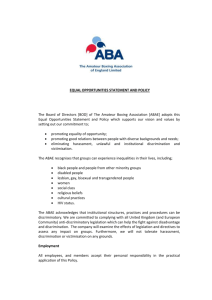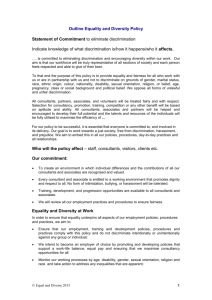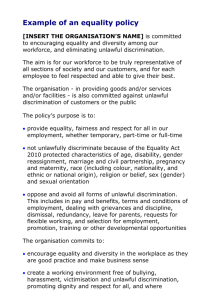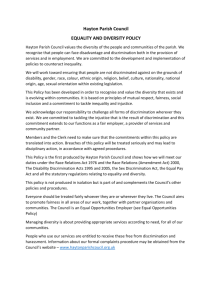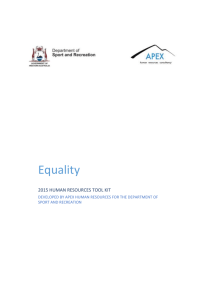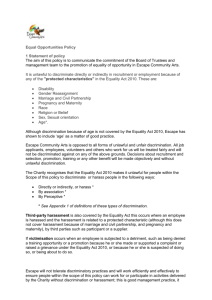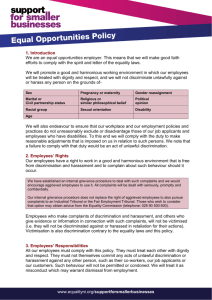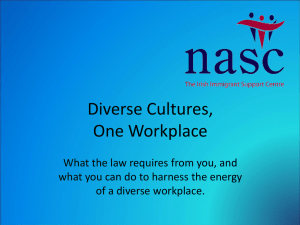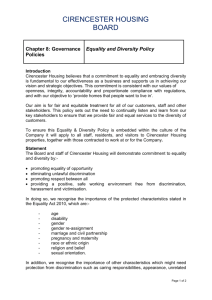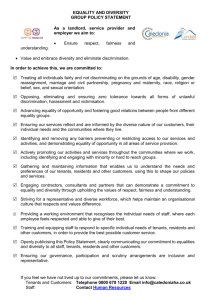Equality and Respect Policy
advertisement
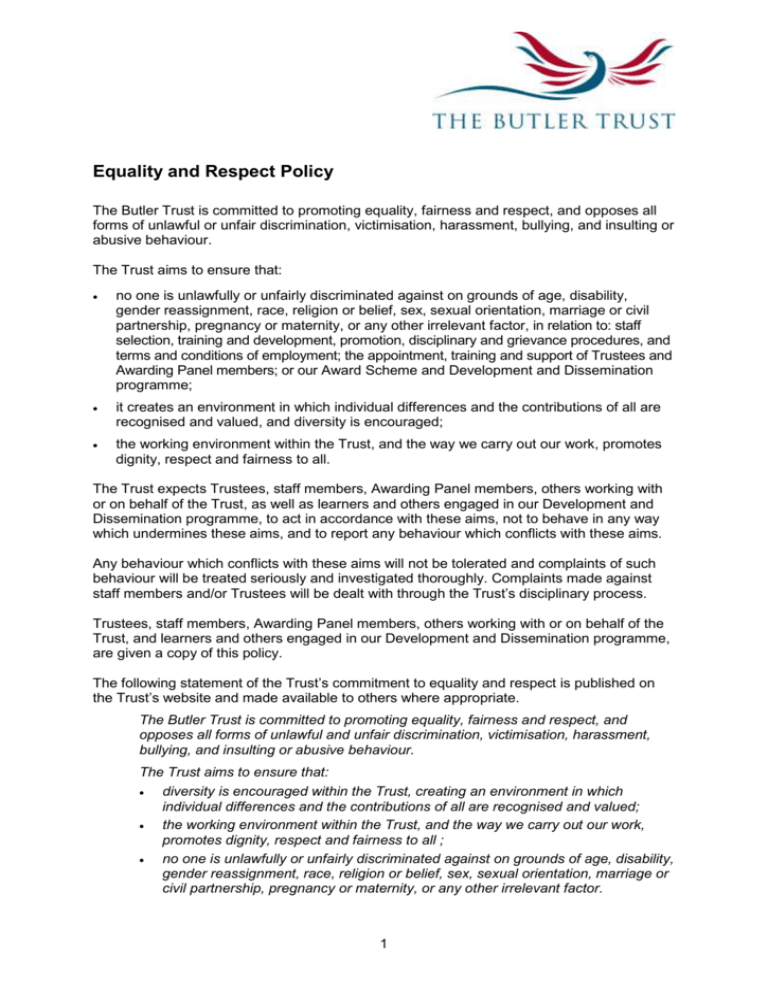
Equality and Respect Policy The Butler Trust is committed to promoting equality, fairness and respect, and opposes all forms of unlawful or unfair discrimination, victimisation, harassment, bullying, and insulting or abusive behaviour. The Trust aims to ensure that: no one is unlawfully or unfairly discriminated against on grounds of age, disability, gender reassignment, race, religion or belief, sex, sexual orientation, marriage or civil partnership, pregnancy or maternity, or any other irrelevant factor, in relation to: staff selection, training and development, promotion, disciplinary and grievance procedures, and terms and conditions of employment; the appointment, training and support of Trustees and Awarding Panel members; or our Award Scheme and Development and Dissemination programme; it creates an environment in which individual differences and the contributions of all are recognised and valued, and diversity is encouraged; the working environment within the Trust, and the way we carry out our work, promotes dignity, respect and fairness to all. The Trust expects Trustees, staff members, Awarding Panel members, others working with or on behalf of the Trust, as well as learners and others engaged in our Development and Dissemination programme, to act in accordance with these aims, not to behave in any way which undermines these aims, and to report any behaviour which conflicts with these aims. Any behaviour which conflicts with these aims will not be tolerated and complaints of such behaviour will be treated seriously and investigated thoroughly. Complaints made against staff members and/or Trustees will be dealt with through the Trust’s disciplinary process. Trustees, staff members, Awarding Panel members, others working with or on behalf of the Trust, and learners and others engaged in our Development and Dissemination programme, are given a copy of this policy. The following statement of the Trust’s commitment to equality and respect is published on the Trust’s website and made available to others where appropriate. The Butler Trust is committed to promoting equality, fairness and respect, and opposes all forms of unlawful and unfair discrimination, victimisation, harassment, bullying, and insulting or abusive behaviour. The Trust aims to ensure that: diversity is encouraged within the Trust, creating an environment in which individual differences and the contributions of all are recognised and valued; the working environment within the Trust, and the way we carry out our work, promotes dignity, respect and fairness to all ; no one is unlawfully or unfairly discriminated against on grounds of age, disability, gender reassignment, race, religion or belief, sex, sexual orientation, marriage or civil partnership, pregnancy or maternity, or any other irrelevant factor. 1 The Trust’s policies, procedures and practices, including (though not only) in relation to staff recruitment, management and development, and the operation of the Award Scheme and Development and Dissemination Programme, are reviewed at least annually, and an annual action plan is drawn up, to ensure compliance with the 2010 Equality Act and the Trust’s wider commitment to equality, fairness and respect. And this policy itself is also reviewed at least annually. ------------------------------------ ------------------------------------------- Malcolm Butler Chair Simon Shepherd Director March 2015 To be reviewed March 2016 2 Glossary Discrimination The Equality Act 2010 identifies a number of “protected characteristics”: age, disability, gender reassignment, race, religion or belief, sex, sexual orientation, marriage / civil partnership and pregnancy / maternity. The Act outlaws both direct and indirect discrimination relating to protected characteristics, whether towards those working with us (including Trustees, staff, job applicants, secondees, Awarding Panel members, contractors and volunteers) or towards our service users (nominees, potential nominees, Award Winners and Commendees). Unfair discrimination is any form of discrimination which disadvantages someone or a group of people on the grounds of any irrelevant factor, whether covered by the 2010 Act or not. “Direct discrimination” arises where someone is treated less favourably than another person because of a protected characteristic they have, or are thought to have (“perception discrimination”), or because they associate with someone who has a protected characteristic (“discrimination by association”). “Indirect discrimination” arises where an organisation has rules, policies or practices which result in particular disadvantage to people who share a given protected characteristic. Victimisation Victimisation occurs when a person is treated unfavourably because they either have, or are believed to have, raised or supported a complaint or grievance against someone else or rejected advances or proposals made by someone else. Victimisation is unlawful under the 2010 Equality Act where someone is treated badly because they have made or supported a complaint under the Equality Act, have raised a grievance relating to the Act, or are believed to have done any of the above. Harassment ACAS describes harassment as unwanted conduct related to a personal characteristic (actual or perceived) which has the purpose or effect of violating an individual’s dignity or creating an intimidating, hostile, degrading, humiliating or offensive environment for that individual. Harassment may be by an individual against an individual (perhaps by someone in a position of authority such as a manager or supervisor) or involve groups of people. It may be obvious or it may be insidious. Harassment is proscribed under the 2010 Equality Act where it relates to a protected characteristic. Bullying According to ACAS, bullying may be characterised as offensive, intimidating, malicious or insulting behaviour, an abuse or misuse of power through means that undermine, humiliate, denigrate or injure the recipient. Like with harassment, bullying may be by an individual against an individual or involve groups of people, and may be obvious or insidious. 3

